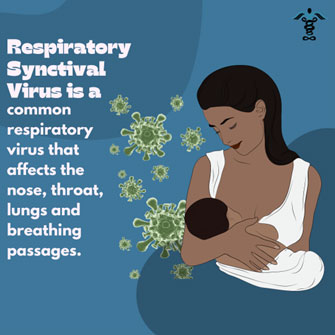Respiratory syncytial virus (RSV) is a contagious virus that infects the lungs and tends to spread in the colder months. It is usually not very dangerous in adults, but it can be severe in newborns and babies. RSV is the most common reason for hospital admissions among babies in the United States.
- What makes it different from any other cold or flu? This virus specifically is life threatening for babies because their immune system is not fully developed. Infection with RSV can lead to low oxygen for the baby.
- Who should get the RSV vaccine? ACOG recommends the Pfizer RSV vaccine for pregnant women who are 32 to 36 weeks pregnant between September to January. It can be given at the same time as other vaccines.
- Why should I get this vaccine? There are two important benefits of receiving the RSV vaccine. Firstly, a healthy mother means a healthy baby. The vaccine creates antibodies in pregnant women so they have immunity to the virus and are less likely to get sick or have a severe infection. A pregnant person who is immune to the virus will be less likely to get sick and less likely to pass the infection on to her newborn. Secondly, the mother can pass the antibodies on to their fetus, providing the baby with some antibodies to protect against RSV for the first 6 months after birth, and during breastfeeding.
- What happens if I do not get the vaccine? If a mother is not vaccinated against RSV, there is another option to help prevent RSV infection called nirsevimab which is an injection given to newborns. It contains lab-made antibodies that protect against RSV and is not a vaccine. It has recently been in low supply.
- Is it covered by my insurance? Which insurances cover it? Yes, the RSV vaccine is an official inclusion on the CDC vaccination protocol for pregnant women so it is covered by all insurances in the USA.
- Is there a specific vaccine that I should get? There are multiple RSV vaccines approved by the FDA. The only RSV vaccine approved for use in pregnancy is the Pfizer-made Abrysvo. It is given at many pharmacies with an appointment or walk-in. DO NOT get any other RSV vaccine if you are pregnant.
- What are common side effects of the RSV vaccine, and should they be a cause for concern? Common side effects include injection site pain/soreness, headache, muscle ache, and nausea, similar to other vaccine side effects. These side effects are common and should go away within a few days of vaccination.
Read more about the RSV vaccine here:
https://www.acog.org/-/media/project/acog/acogorg/files/pdfs/news/rsv-joint-statement-2023.pdf https://www.cdc.gov/mmwr/volumes/72/wr/mm7241e1.htm?s_cid=mm7241e1_w


